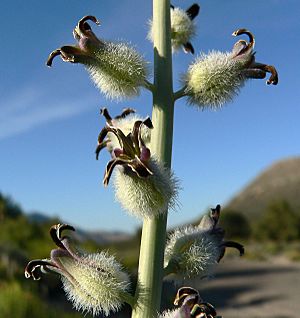Thickstem wild cabbage facts for kids
Quick facts for kids Thickstem wild cabbage |
|
|---|---|
 |
|
| var. crassicaulis | |
| Conservation status | |
| Scientific classification | |
| Genus: |
Caulanthus
|
| Species: |
crassicaulis
|
Caulanthus crassicaulis, also known as thickstem wild cabbage, is a cool plant that grows in the western United States. It's a type of flowering plant and belongs to the Brassicaceae family, which also includes plants like broccoli and cabbage! This plant is special because it can live for many years, making it a perennial herb.
You can find thickstem wild cabbage growing in different places like sagebrush areas, woodlands, and dry desert scrublands. It's a tough plant that can handle these environments.
What Does Thickstem Wild Cabbage Look Like?
This plant has a strong, thick stem that looks a bit swollen, almost like a bottle. This stem grows from a woody base called a caudex, which helps it store water and nutrients.
Leaves of the Plant
The leaves of the thickstem wild cabbage grow in a circle close to the ground, like a rosette. Other leaves are found along the stem. The leaves near the bottom are wide and shaped like a spear. As you go up the stem, the leaves get much smaller and thinner. Their edges can be smooth, slightly toothed, or even deeply cut.
Flowers and Fruits
The flowers of this plant are round and have thick, pouch-like outer leaves called sepals. These sepals open up at the tip to show narrow petals that are usually dark purple or brown.
There are two main types, or varieties, of thickstem wild cabbage:
- var. crassicaulis: This type usually has flowers that feel a bit hairy.
- var. glaber: This type has flowers that are smooth and hairless.
After the flowers, the plant produces a long, thin fruit called a silique. These fruits can grow up to 13 centimeters (about 5 inches) long!


